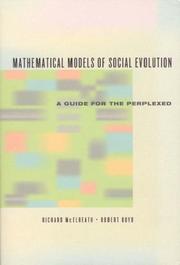| Listing 1 - 10 of 51 | << page >> |
Sort by
|
Book
ISBN: 0871547716 Year: 1972 Publisher: New York Russell Sage Foundation
Abstract | Keywords | Export | Availability | Bookmark
 Loading...
Loading...Choose an application
- Reference Manager
- EndNote
- RefWorks (Direct export to RefWorks)
Social change --- Etats-unis --- Evolution sociale --- Changement (sociologie) --- ETATS-UNIS --- EVOLUTION SOCIALE --- CHANGEMENT (SOCIOLOGIE)
Book
ISBN: 9780226520438 0226520439 9780226520445 0226520447 Year: 2011 Publisher: Chicago, Ill. University of Chicago Press
Abstract | Keywords | Export | Availability | Bookmark
 Loading...
Loading...Choose an application
- Reference Manager
- EndNote
- RefWorks (Direct export to RefWorks)
Social evolution. --- Culture. --- Social change --- History of civilization --- Philosophy and psychology of culture --- Évolution sociale.

ISBN: 208064193X 9782080641939 Year: 1979 Publisher: Paris: Flammarion,
Abstract | Keywords | Export | Availability | Bookmark
 Loading...
Loading...Choose an application
- Reference Manager
- EndNote
- RefWorks (Direct export to RefWorks)
History of civilization --- Evolution sociale --- Culture --- Homme --- Origines --- Influence de l'environnement --- Évolution sociale --- Anthropologie --- Philosophie de l'homme --- Culture - Origines --- Homme - Influence de l'environnement --- Civilisation --- Ethnologie -- philosophie --- Société primitive

ISBN: 0807015121 9780807015124 9780807015131 080701513X Year: 1979 Volume: 572 Publisher: Boston: Beacon Press,
Abstract | Keywords | Export | Availability | Bookmark
 Loading...
Loading...Choose an application
- Reference Manager
- EndNote
- RefWorks (Direct export to RefWorks)
Sociology of culture --- Social evolution --- Pragmatics --- Historical materialism --- State, The --- Social sciences --- Philosophy --- Social sciences - Philosophy --- Evolution sociale --- Pragmatique --- Matérialisme historique --- Etat --- Sciences sociales --- Philosophie
Book
ISBN: 9780520270282 0520270282 Year: 2011 Publisher: Berkeley, Calif. University of California Press
Abstract | Keywords | Export | Availability | Bookmark
 Loading...
Loading...Choose an application
- Reference Manager
- EndNote
- RefWorks (Direct export to RefWorks)
Philosophy of nature --- World history --- Prehistory --- Human evolution. --- Social evolution. --- Anthropology, Prehistoric. --- World history. --- Homme --- Evolution sociale --- Anthropologie préhistorique --- Histoire universelle --- Evolution
Book
ISBN: 9781509556601 9781509556618 Year: 2024 Publisher: Cambridge, UK ; Hoboken, NJ, USA : Polity,
Abstract | Keywords | Export | Availability | Bookmark
 Loading...
Loading...Choose an application
- Reference Manager
- EndNote
- RefWorks (Direct export to RefWorks)
""Is the future about to close in, or is it open to new horizons? For anthropologist Tim Ingold, the root of our difficulty in facing up to the future lies in the way we think about generations. We imagine them as layers, succeeding one another like sheets in a stack. This view figures as a largely unquestioned backdrop to discussions of evolution, life and death, longevity, extinction, sustainability, education, climate change, and other matters of contemporary concern. What if we were to think of generations, instead, as wrapping around one another along their length, more like fibres in a rope than stacked sheets? In this compelling new book, Ingold argues that a return to the idea that life is forged in the collaboration of overlapping generations might not only assuage some of our anxieties, but also offer a lasting foundation for future coexistence. But it would mean having to abandon our faith both in the inevitability of progress, and in the ability of science and technology to cushion humanity from environmental impacts. A perfect world is not around the corner, nor will our troubles ever end. Nevertheless, for as long as life continues, there is hope for generations to come.""--
Ethnology. Cultural anthropology --- Age groups. --- Generations. --- Social evolution. --- Social change. --- Évolution sociale. --- Générations. --- Groupes d'âge. --- Générations. --- Évolution sociale. --- Changement social.
Book
ISBN: 2200372469 9782200372460 Year: 1991 Publisher: Paris : Colin,
Abstract | Keywords | Export | Availability | Bookmark
 Loading...
Loading...Choose an application
- Reference Manager
- EndNote
- RefWorks (Direct export to RefWorks)
Civilisation --- Prévision --- Prévision économique --- Prévision sociale --- Histoire économique --- Histoire sociale --- AA / International- internationaal --- 331.068 --- 202 --- 174 --- Futurologie. --- Sociale organisatie. --- Verband tussen de ethiek en de economie. Ethiek en bedrijf. --- Futurologie --- Sociale organisatie --- Verband tussen de ethiek en de economie. Ethiek en bedrijf --- Civilisation - 1950 --- -Histoire économique - 1971-1990 --- Histoire sociale - 1970 --- -Évolution sociale --- Entreprises -- Planification --- Planification stratégique --- Évolution sociale
Book
ISBN: 9780226346908 9780226005782 022600578X 0226346900 9780226346922 0226346927 128305826X 9786613058263 Year: 2010 Publisher: Chicago : The University of Chicago Press,
Abstract | Keywords | Export | Availability | Bookmark
 Loading...
Loading...Choose an application
- Reference Manager
- EndNote
- RefWorks (Direct export to RefWorks)
Of paramount importance to the natural sciences, the principles of Darwinism, which involve variation, inheritance, and selection, are increasingly of interest to social scientists as well. But no one has provided a truly rigorous account of how the principles apply to the evolution of human society-until now.In Darwin's Conjecture, Geoffrey Hodgson and Thorbjørn Knudsen reveal how the British naturalist's core concepts apply to a wide range of phenomena, including business practices, legal systems, technology, and even science itself. They also critique some prominent object
Social change --- Evolution. Phylogeny --- Philosophy and psychology of culture --- Ethnology. Cultural anthropology --- Human ecology. Social biology --- Évolution sociale --- Sélection naturelle --- Aspect social --- Évolution sociale. --- Aspect social. --- Social Darwinism. --- Social evolution. --- Natural selection --- Darwinism --- Selection, Natural --- Genetics --- Variation (Biology) --- Biological invasions --- Evolution (Biology) --- Heredity --- Cultural evolution --- Cultural transformation --- Culture, Evolution of --- Culture --- Evolution --- Darwinism, Social --- Competition --- Social conflict --- Social evolution --- Social aspects.

ISBN: 2070736288 9782070736287 Year: 1996 Volume: 268 Publisher: Paris: Gallimard,
Abstract | Keywords | Export | Availability | Bookmark
 Loading...
Loading...Choose an application
- Reference Manager
- EndNote
- RefWorks (Direct export to RefWorks)
Civilisation --- Equality --- Progress --- Social justice --- Social evolution --- Civilization, Modern --- Egalité (Sociologie) --- Progrès --- Justice sociale --- Evolution sociale --- Civilisation moderne et contemporaine --- Social aspects --- Aspect social --- Social history --- Socialization --- Egalité (Sociologie) --- Progrès --- Social history - 20th century

ISBN: 9780226558271 0226558274 9780226558264 0226558266 Year: 2007 Publisher: Chicago (Ill.) : University of Chicago press,
Abstract | Keywords | Export | Availability | Bookmark
 Loading...
Loading...Choose an application
- Reference Manager
- EndNote
- RefWorks (Direct export to RefWorks)
Over the last several decades, mathematical models have become central to the study of social evolution, both in biology and the social sciences. But students in these disciplines often seriously lack the tools to understand them. A primer on behavioral modeling that includes both mathematics and evolutionary theory, 'Mathematical Models of Social Evolution 'aims to make the student and professional researcher in biology and the social sciences fully conversant in the language of the field. Teaching biological concepts from which models can be developed, Richard McElreath and Robert Boyd introduce readers to many of the typical mathematical tools that are used to analyze evolutionary models and end each chapter with a set of problems that draw upon these techniques. 'Mathematical Models of Social Evolution 'equips behaviorists and evolutionary biologists with the mathematical knowledge to truly understand the models on which their research depends. Ultimately, McElreath and Boyd's goal is to impart the fundamental concepts that underlie modern biological understandings of the evolution of behavior so that readers will be able to more fully appreciate journal articles and scientific literature, and start building models of their own.
| Listing 1 - 10 of 51 | << page >> |
Sort by
|

 Search
Search Feedback
Feedback About UniCat
About UniCat  Help
Help News
News